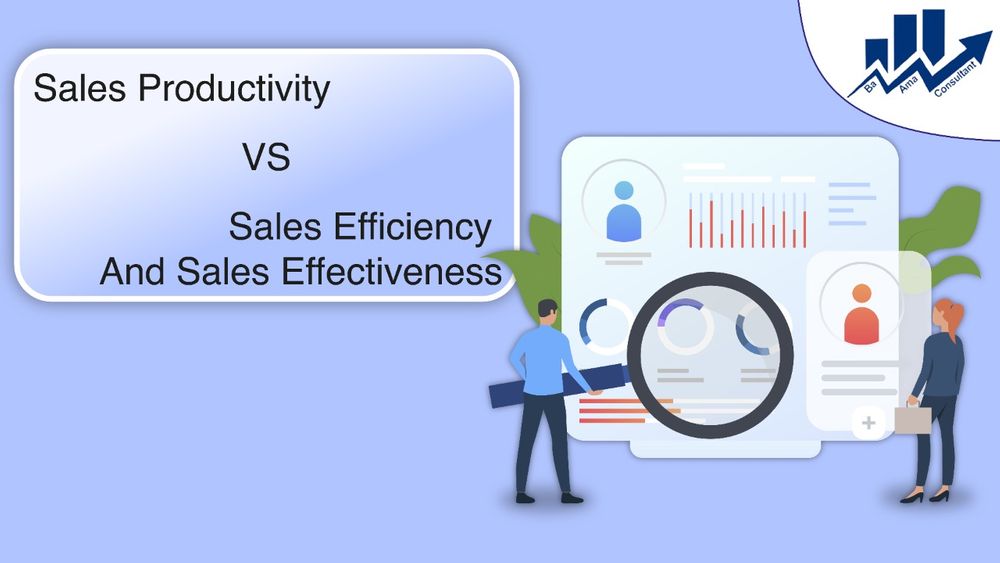In the sales and marketing industry, we need to know sales productivity vs sales efficiency and sales effectiveness It can be argued that these terms have a significant meaning for those in the business of improving sales.
In practice, all three are often used to describe almost any type of sales improvement. This is where the issue begins. Let’s have a clear view at sales productivity vs sales efficiency and sales effectiveness.
It is essential to know the difference between productivity, efficiency, and effectiveness in a sales team to be able to manage each of them effectively.
As a productivity coach, it has certainly proven useful for me to see these as distinct terms so I thought it would be useful to put some definitions around them. In addition to providing structure for sales improvement initiatives, it facilitates a more thorough analysis of sales force issues.
What is Sales productivity:
As I see it, sales productivity results from sales processes that are efficient and effective. Any sales improvement effort must aim to increase productivity. When your salespeople become more efficient or effective, they are automatically more productive.
According to research, companies were measuring productivity with metrics such as ‘revenue per representative’ or ‘percentage of representatives above sales target. A sales team’s productivity is simply the amount of sales they produce.
What is Sales efficiency:
Sales efficiency refers to the efficient allocation of sales resources. The most valuable resource in any sales team is time. Each day has the same number of hours for everyone. Therefore, in order for your sales team to perform efficiently you need to maximize the amount of productive time that they have in a day.
By eliminating low-value activities, and replacing them with high-value activities, you will increase your productivity. For example, you might measure efficiency by assessing the number of sales calls per representative or frequency of sales calls.
What is Sales effectiveness:
The most important factor in determining the effectiveness of your sales force is not how you allocate its resources but how effectively you employ them. If you can get your sales representatives to make an additional 10 prospecting calls each week, you have achieved the goal of improved efficiency. The ability of your reps to execute those customer calls is a sure indicator of their effectiveness.
From 10 calls, a more effective sales representative could generate more opportunities, while a less effective representative may create only a few. As a result of their improved performance, more effective salespeople will result in greater output from the same level of effort. For example you might measure effectiveness by ‘deal win rate’ and ‘percentage of successful sales calls’.
In one example of how efficiency and effectiveness differ, someone said: Efficiency is about knocking on as many doors as you can; Effectiveness is about what you do when those doors open. There are two different forces at work that influence the productivity of your sales team, whether you call it ‘Will Vs. Skill’ or ‘Brawn Vs. Brain.’
Relationship between sales efficiency, effectiveness and productivity:
The ultimate objective of good sales management is to increase efficiency and effectiveness, but you should approach these two factors differently. The easiest way to improve efficiency is simply to reschedule tasks to give more time to more productive work.
Using just a little bit of discipline and thought, it is possible to improve efficiency today. You need to invest a lot more in improving effectiveness because it involves your sales team developing additional capabilities. To reach higher levels of sales effectiveness, there has almost always been a period of learning and adoption involved, whether it is through training, coaching, or implementing new sales tools. Regardless, it is always important to keep pushing forward on both fronts.
The ratio efficiency and effectiveness can be used to calculate sales productivity. If, for example, a sales representative makes 60 Doctors calls each week (a measure of efficiency), and each call yields 1 Rx / call of value 500 (a measure of effectiveness), then productivity will be Rs.30,000 per week.
You can, however, gain valuable insight into your sales improvement efforts by distinguishing the terms. Effectiveness, efficiency, and productivity in sales differ in subtle but important ways. You may buy software to boost your company’s efficiency, but it might not improve its effectiveness.
Knowing the difference is critical for planning better. The sales productivity vs sales efficiency and sales effectiveness relationship is very much connected to one another.
In summary, we can conclude these 3 points;
- Improving efficiency and effectiveness increases sales productivity.
- Since efficiency is often merely a reorganization of current salesperson effort, it is relatively easy to improve.
- Effectiveness is much more difficult to achieve since it depends on improved salesperson abilities.

